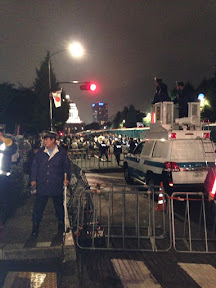The protests are broken up by the police. Not in the sense that people can't protest, but in the sense that they keep people from forming a mass group. They say it's about safety, but it's not because the police buses are parked end to end and if someone did for example have a heart attack, they are locked in by the barricades and the buses
The real reason is to stop the protesters getting a sense of unity, but more importantly to make it impossible to get photos like this:

http://ajw.asahi.com/article/behind_news/politics/AJ201508300022
Instead the government prefers pictures like the ones below, which make protests seem dangerous, frightening and criminal. In reality though there was so much positive energy last night. People are seeing it as a beginning not an end.


Pictures are power. Pictures win and lose wars.
This is what democracy looks like.
We don't need collective security. Let's vote out the Diet members who voted for this.
